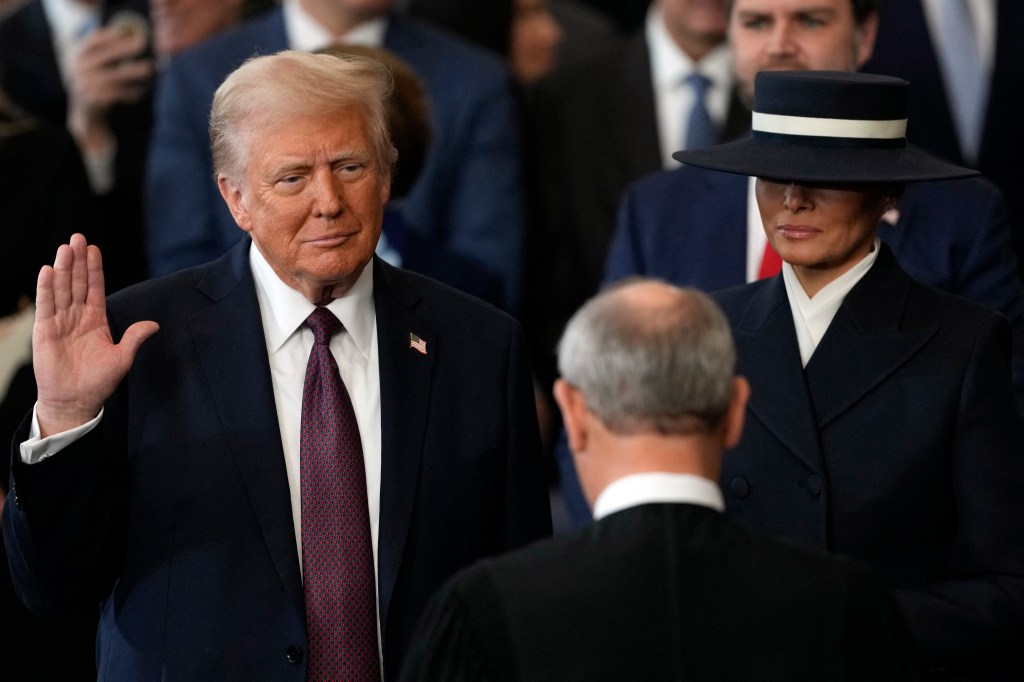
If you’re not tired of all the winning already in President Donald Trump’s second term, just wait until his third. Constitutionally impossible, maybe, but that hasn’t stopped the president from entertaining the idea.
When asked by Kristen Welker of NBC News this weekend if he wants to run for a third term, Trump answered cryptically, “I like working.” Asked to clarify, he said, “I’m not joking,” before adding, “it is far too early to think about it.” How might Trump get around the pesky problem of the Constitution’s 22nd Amendment, which bars presidents from being elected to more than two four-year terms? “There are methods which you could do it,” he told Welker.
A real possibility or the ultimate troll? With Trump you never know for sure, but I’m told by one person close to the president’s team that there’s a “semi-serious effort” to at least figure out what options are available for Trump to circumvent the Constitution’s two-term limit on the presidency. Who is behind that effort is less clear, with the White House declining to comment on those specifics.
“As the President said, it’s far too early to think about it and he is focused on undoing all the hurt Biden has caused and Making America Great Again,” said White House Communications Director Steve Cheung on Monday when I asked several questions about who at the White House is examining possible paths for a third term. Cheung did not deny that someone, somewhere is looking into it on Trump’s behalf.
One person who has been outspoken in support of a third term is Steve Bannon, the White House aide during Trump’s first term who has built a media empire of Trump loyalism. For the past few months on his daily live show War Room, Bannon has been periodically suggesting Trump could run and win the presidency again in 2028. But it was his recent appearance on Chris Cuomo’s NewsNation show that seems to have launched the proposal beyond the MAGA mediasphere.
“I’m a firm believer that President Trump will run and win again in 2028,” Bannon told Cuomo, adding that a nebulous “we” are working on “a couple alternatives” around the Constitution’s prohibition.
Then, over the weekend, Britain’s Daily Mail published what it termed an “exclusive” to explain how Trump could serve two additional terms after his current one. That involves a bankshot process requiring Trump to run as J.D. Vance’s vice presidential nominee, with Vance resigning as soon as he assumes the presidency in order to allow Trump to succeed him. (A fourth term for the then-86-year-old Trump would involve some similar resignation gymnastics.)
From there the idea migrated to the respectable political media. In her Sunday interview with Trump, Welker brought up the idea directly. “That’s one” method, he reportedly said to her. “But there are others too.”
It’s uncertain how seriously Trump is taking the idea right now, and his allies on Capitol Hill seem to think he’s pulling the media’s collective leg. If his team were honest with him, they would note how many roadblocks stand in the president’s way.
There’s not only the 22nd Amendment but also the 12th Amendment, which lays out the conditions for electing the president and vice president. The language at the end of that amendment that “no person constitutionally ineligible to the office of President shall be eligible to that of Vice-President of the United States” appears to rule out the Daily Mail’s running-mate switcheroo scenario. And the idea that Vance or any other Republican, if duly elected president, would willingly step aside in order to reinstall Trump beggars belief.
An attempt to place Trump on the ballot as either a presidential candidate or as Vance’s vice presidential running mate would prompt legal challenges. Even Trump allies have acknowledged to me that this Supreme Court is unlikely to find a novel reading of the Constitution’s words here, though there will undoubtedly be legal theories that say otherwise. In the meantime, while Trump sycophants like Rep. Andy Ogles may push for loosening the presidential term limits via more conventional ways, there’s no evidence of the level of broad popular support necessary to further amend the Constitution on such a divisive point.
There are other political limitations to consider. To start, Trump could be pulled down by the political gravity that often affects two-term presidents. The public’s opinion of Trump at the end of 2028 could be so bad that he couldn’t win a third term if he tried, much less get there via a stand-in like Vance. (A tariff-driven recession, by the way, may be enough to tank his poll numbers for the long haul.) And even if the next four years are deemed a success, the public could sour on the idea of Trump holding onto power past the constitutional and conventional two terms.
So what’s really going on with all of this third-term talk?
Beyond the glee with which Trump and his team greet the chance to make his opponents’ heads explode, the conversation may have more to do with how Bannon is positioning himself as a potential successor to the president. Before you laugh, it’s worth remembering that in the Conservative Political Action Conference’s annual straw poll for the next presidential election, Vance was the overwhelming favorite at 61 percent. In second place at 12 percent? Bannon.
Talk of a third term flatters Trump’s ego, rankles liberals, and redirects the 2028 conversation away from viewing Vance as the heir apparent. And if the president does bow to the reality that he can’t keep running, it could be his most dedicated loyalist, the one who insisted Trump should run again, who benefits.

















